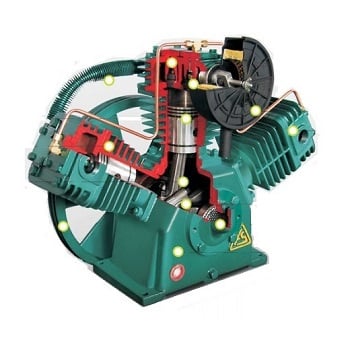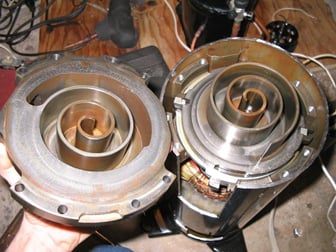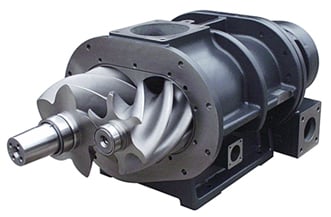What Are 3 Types Of Air Compressors For Mobile Applications?
Compressed air keeps the world moving and there are many air compressor options available on the market today. In this article, we will provide a quick overview of 3 types of air compressors commonly used in mobile applications.
Mobile air compressors need to endure more demanding environments than stationary air compressors. They must withstand constant vibration and motion from the vehicle they are mounted on and need to be able to work in every type of weather. For this reason, it’s crucial to choose an air compressor that was designed for mobile use.
There are three common types of mobile air compressors: reciprocating, scroll, and rotary screw. Each air compressor type has its strengths and weaknesses, and it’s important to consider these carefully when deciding which air compressor is best for your needs.
Reciprocating Air Compressors
Reciprocating air compressors use moving pistons to force trapped air into a smaller space. The compressed air is then pushed into an air receiver tank, where it is stored until used. Most reciprocating air compressors for mobile use have two or three pistons.
Reciprocating air compressors are currently the most common air compressor used on vehicles and other mobile applications because they are inexpensive and easy to source. Professionals who are new to their careers or looking to spend the lowest upfront capital will naturally gravitate towards reciprocating air compressors.
However, they aren’t the best compressed air investment. Reciprocating air compressors have a much shorter lifespan than the other two options and they can’t provide a continuous supply of air. Instead, reciprocating compressors rely on bulky air receiver tanks to store previously compressed air to help meet demand and dampen pulsations from the discharge line. Unfortunately, these air receiver tanks are heavy, take up a notable amount of space, and still don’t always keep up with pneumatic tools and equipment.
When reciprocating air compressors do break down, they tend to be the easiest type of air compressor to fix. However, it will still take someone with expertise to repair the machine, and these costs quickly add up. Many people toss out reciprocating air compressors after their short warranties expire because it’s simply not worth the money to fix them.
Benefits
- Low upfront cost
- Easy to source
- Simpler maintenance
- Capable of high pressures
Disadvantages
- Interrupted air flow / 20 to 30% duty cycle
- Low lifespan
- Short warranty coverage
- Requires an air receiver tank
- Noisy
- Generates excessive heat
Scroll Air Compressors
Scroll air compressors are a simple compressor solution that uses two spiral elements. One element remains still, while the other spins, trapping air between the moving parts. That air becomes compressed as it is pushed into the center of the spiral and through the system.
Scroll air compressors are the least popular type of air compressor for mobile applications, and rarely (if ever) used on trucks and vans, for a few reasons: they are expensive, have low CFM outputs, and generate a significant amount of heat that has to be managed. They are also extremely difficult to repair if they break and are more challenging to source in North America.
However, there is a time and place for scroll air compressors, particularly in OEM applications with requirements that match the scroll compressors’ benefits; scroll compressors are extremely quiet, have zero vibrations, and don’t require oil.
Benefits
- Extremely quiet
- Compact design
- Minimal moving parts
- Low maintenance
- Oil-free
Disadvantages
- Low CFM output
- Expensive
- Extremely difficult to repair
- Generates significant heat
Rotary Screw Air Compressors
Rotary screw air compressors are a compact, powerful compressed air solution that is used in a wide variety of mobile industries. With this type of compressor, two meshed screws spin together, forcing air to become compressed as it passes through the screws.
Rotary screw air compressors are a great option for mobile applications because they take up minimal space, while generating compressed air at 100% duty cycle. There is no interruption to air flow, allowing operators to get their work done quickly and efficiently.
Rotary screw air compressors are also durable, with incredibly long lifespans. Some rotary screw manufacturers, including VMAC, are able to offer limited lifetime warranties on their rotary screw air compressors because of their longevity.
The only two disadvantages with rotary screw air compressors are their upfront cost, which is higher than reciprocating air compressors, and they require skilled maintenance in the rare occasion that they do break down. However, with careful budgeting and basic service maintenance, which can be performed by almost anybody, most people find that the disadvantages of rotary screw air compressors are negligible.
Benefits
- Small, compact designs:
- Up to 80 ft³ smaller
- Up to 1,900 lb lighter
- 100% duty cycle
- Higher CFM per hp
- Long lifespan
- Better warranty protection
- Energy efficient
- Quieter
Disadvantages
- Upfront cost
- Requires skilled maintenance if fully broken
To read more about rotary screw air compressors, check out some of our other articles:
Easy Guide to Rotary Screw Air Compressors
Truck Mounted Rotary Screw Air Compressors For Service Vehicles
Reciprocating Or Rotary Screw For OEM Applications?



